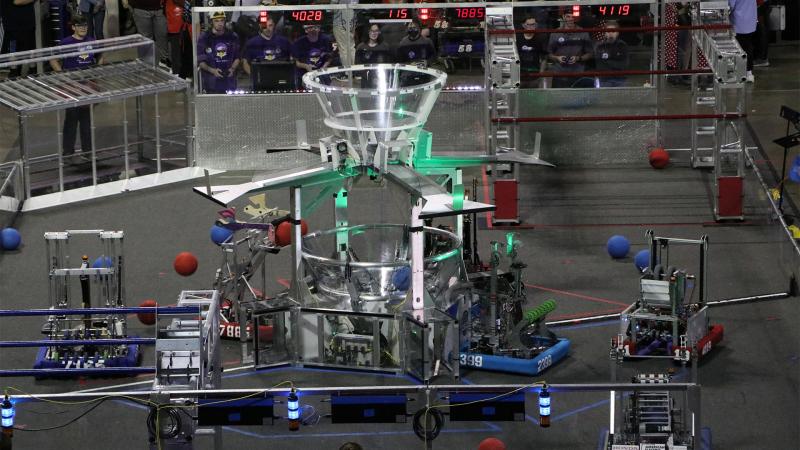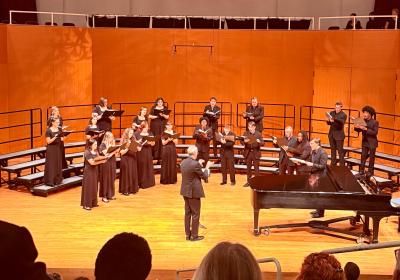
CSU hosts FIRST Robotics regional high school competition
High school teams from around America brought their robots to the Wolstein Center for the FIRST Robotics regional, March 24-26.
FIRST stands "For Inspiration and Recognition of Science and Technology." It's a robotics community that prepares young people for the future through a suite of inclusive, team-based robotics programs for students aged 4-18, which schools or after school programs can implement. FIRST's mission is to inspire young adults to join the STEM field (Science, Technology, Engineering and Mathematics).
FIRST aims to "transform our culture by creating a world where science and technology are celebrated and where young people dream of becoming science and technology leaders,” its founder Dean Kamen said.
The program does this by creating a new game every season, where teams have limited time and resources with strict regulations to design, build and program an industrial-size robot to compete in the game with and against other teams.
At the end of each season, teams will have a chance to compete at the FIRST Championship which is also known as the world championship.
For students, it is a chance to experience real-world engineering and a chance to build and sharpen their engineering, science, and technology skills.
The Buckeye Regional
The Wolstein event was the first Buckeye Regional to be hosted at CSU in two years, after COVID-19 forced the cancellation of the 2020 and 2021 competitions. 2019 Regional Winners Team ELITE #48, The Beak Squad #4028 and WorBots #4145 were back this year, hoping to recapture their success from two years ago.
“Being back to in-person events is exhilarating and exhausting,” Frank Bosak, team leader of Team ELITE (Warren, Ohio), said. Almost all of my students are new to robotics and those that have been on the team have a lot to learn.”
“But, seeing their faces when they hear the roar of the crowd our their excitement when our team accomplishes something new, that’s a feeling that I've really missed over the last two years," Bosak said, adding that the adult mentors were just as excited.
The WorBots from Columbus, Ohio were hoping to three-peat after winning in 2018 and 2019. But they had a tough time in qualifiers, finishing 45th out of the 59 teams competing. However, they made it to the playoffs in Cleveland after TAN(X) #3003 invited them to join their alliance.
“I think what it will take to get this regional down is we definitely need to make our traverse climber a lot more consistent, Phillip White, student president and development lead for the WorBots said. "Right now we have been able to make it to rung three in two matches and rung four in one."
“The trick will be getting our second climber essentially to extend properly every time, and that has been a bit of a challenge we have been fighting this whole time.”
Unfortunately, that proved true in the quarterfinals, with the WorBots, TAN(X) #3003 alliance losing match one 77-63 and match two 88-58.
The Beak Squad from Cincinnati, Ohio had a different story. They dominated qualifiers, coming in third out of 59. Their average 77.55 points a match positioned them to captain the second alliance.
Beak Squad were joined by the IgKnighters #3173 from Rochester, New York, and The Botcats #128 from Grandview Heights, Ohio. The alliance swept its quarterfinal and semifinal matches, sending the team into the final round at the Buckeye Regional.
Their opponents were the first alliance, made up of Ranger Robotics #3015 from Spencerport, New York - G.R.R. #340 from Churchville, New York, and OZone Robotics #4611 from Lewis Center, Ohio. Ranger Robotics and G.R.R ranked one and two after qualifiers. OZone Robotics struggled in qualifiers but still managed a creditable 31 out of 59 teams.
Despite the impressive credentials of their opposition, Beak Squad and its alliance showed their mettle, winning the first match 60-49 then dominating the second 108-66.
The alliance were crowned champions of the Buckeye Regional, making Beak Squad back-to-back champions. Beak Squad also captured its first regional win of the season after losing the Finger Lakes Regional and the New York Tech Valley Regional earlier this season in the final round.
Women in STEM
Also competing at the Buckeye Regional were the all-female Girls of Steel #3504 and The Fighting Unicorns #2399, a result of FIRST's support for diversity and inclusion as women are under-represented in STEM, making up just 34% of the STEM workforce.
"We are mostly for the empowerment of women and gender minorities,” Aditri T., a student of Girls of Steel said, adding though, "Anyone is allowed on our team, we are open to any genders."
The Girls of Steel logo is Rose the Riveter with a robotic arm. Rosie came to life during World War Two as a way to illustrate the power of women that had taken jobs in factories, while the men went to fight the war.
‘We can do it’ was Rosie’s famous saying. It symbolized female empowerment, which inspired the Girls of Steel.
"In a male-dominated field such as robotics, the Girls of Steel believe that it is crucial for women and girls to feel respected as strong, hard workers,” the Girls of Steel website say on their website.
Aditri said she feels that her team has won a lot of respect at the FIRST Robotics competitions.
“I think at FIRST competitions, it’s been overall a really good experience. In terms of interacting with other teams, especially with our robot, I think a lot of teams do respect us and give us the appropriate amount of ‘you do know what you are doing’,” Aditri said.
Aditri's role in the team is key. She is electrical lead, co-pit lead, and was the face of the team for the Chairman’s Award, the most prestigious prize in FIRST Robotics, which she and her team went on to win at the Buckeye Regional.
The award "preserves the vision that FIRST Robotics Competition is about more than just building robots; it’s also building the people who will change the world,” according to FIRST Robotics.
Working with Girls of Steel, Aditri's favorite role is when she is working with electrical engineering. She went on to say how much it opened up to her.
“I think my favorite has been electrical leading. Before joining Girls of Steel, I wasn't really a tech person. I joined the team because my friend was on the team,” Aditri said. “Girls of Steel kinda gave me a chance to explore that engineering is a lot bigger than the character you think of sitting at the computer.”
She plans on pursuing a degree in STEM, in either electrical engineering or robotics, possibly both.
“I do electrical work and that's a lot of fun for me, and I didn't know that was a thing before,” Aditri said. “I’m actually a senior. I applied to colleges already. My preferred major is electrical engineering and/or robotics.”
Impact on Mentors
Robotics not only impacts students. It also has an impact on the mentors who volunteer for teams. That's the case for Frank Shively, a mentor on Team ELITE. The season was his 12th year with the team.
When Shively started mentoring the team his son was on it. Now, 12 years later, his daughter is on the team, and to him it means a lot not only to see the growth of his kids but that of all the kids he has been able to help mentor.
“It’s a little unreal because when I started mentoring 12 years ago, she was only five years old," Shively said. "So it hard to believe that it has gone full circle with my son graduating in 2012, and her being a senior this year 10 years later."
Shively said “seeing the growth in the kids as you expose them to new experiences, new learning opportunities, and things they get to do in the shop" have always been his favorite things about being a FIRST mentor.
Shively and his wife are also a part of a FIRST Lego League team that works with younger kids, helping them solve new problems each year.
"As the challenge changed every year, we would have to look into a problem and find a solution and that was one of the most fascinating things,” Shively said. “When they can win an award, and present a product or an idea, they just come to life, and it's awesome to see them do that.”
His daughter would not have it any other way.
“She was the one that told us we are starting a team," Shively said. "On her ninth birthday, she told us, along with Donnell Conner, who has been mentoring for over 20 years, he I, and my wife would be coaching the lego team,” Shively said.
Despite the age difference between the younger and older students, Shively says the goals and the rewards are the same.
“A lot of the challenges are the same. Their personal growth, their growth in the ideals behind FIRST. Gracious professionalism and cooperation -- teach them the importance of those things and seeing them grasp that concept is one of the most award things you can come across in any first program,” Shively said.
His favorite moment during his 12 years with FIRST was in 2019, when he, his son, his daughter and his niece were all together at the world championship, held that year in Detroit, Michigan.
Shively said it was all about being there together "on the team at different years and different stages, and different experience levels.
“Even different jobs," he said. "They all didn't do driving or one task on the team. They all did different tasks but they all found success and have really enjoyed doing it...For me getting to be there with them at a world championship event was phenomenal.”




